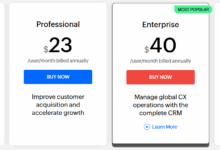AI-Powered CRM Software: Revolutionizing Customer Relationship Management
AI-Powered CRM Software sets the stage for this enthralling narrative, offering readers a glimpse into a story that is rich in detail and brimming with originality from the outset. Customer segmentation, personalization strategies, predictive analytics, customer support enhancement, marketing campaign automation, and more await exploration in this captivating journey.
Understanding Customer Segmentation in AI-Powered CRM Software
Customer segmentation in CRM refers to the process of dividing a customer base into distinct groups based on specific characteristics such as demographics, behavior, or preferences. This segmentation allows businesses to tailor their marketing strategies, product offerings, and customer interactions to meet the unique needs of each group effectively.
Utilizing AI for Effective Customer Segmentation
AI technology plays a crucial role in enhancing customer segmentation in CRM software by analyzing vast amounts of data to identify patterns and trends. Machine learning algorithms can automatically segment customers based on their purchase history, online behavior, and interactions with the company. This automated process ensures more accurate and timely segmentation, leading to personalized customer experiences and targeted marketing campaigns.
- AI algorithms can analyze customer data in real-time, allowing businesses to respond promptly to changing customer preferences and behaviors.
- By segmenting customers effectively, businesses can create personalized marketing campaigns that resonate with each target audience, ultimately leading to higher conversion rates and customer satisfaction.
- AI-powered CRM software can also predict customer needs and preferences, enabling businesses to proactively address issues or offer relevant products and services before customers even realize they need them.
Benefits of Customer Segmentation in CRM Software
Implementing customer segmentation in CRM software offers numerous benefits to businesses, including:
- Improved customer engagement and loyalty through personalized interactions
- Increased sales and revenue by targeting the right customers with relevant offers
- Enhanced customer satisfaction by delivering tailored solutions and experiences
- Optimized marketing efforts by focusing resources on high-value customer segments
Features of AI-Powered CRM Software
AI-Powered CRM software comes with a variety of features that set it apart from traditional CRM systems. These advanced capabilities leverage artificial intelligence to enhance customer relationship management in various ways.
Key Features of AI-Powered CRM Software
- Automated Data Entry: AI-Powered CRM systems can automatically capture and enter customer data, reducing manual data entry tasks for users.
- Predictive Analytics: These systems use AI algorithms to analyze data and predict future trends, helping businesses make informed decisions.
- Lead Scoring and Segmentation: AI-Powered CRM software can score leads based on their behavior and segment customers for targeted marketing campaigns.
- Chatbots and Virtual Assistants: Integration of AI-powered chatbots and virtual assistants enable quick responses to customer queries and enhance customer engagement.
Comparison with Traditional CRM Software
- Traditional CRM software relies on manual data entry and basic analytics, while AI-Powered CRM systems automate processes and provide advanced analytics for better insights.
- AI-Powered CRM software offers real-time personalization and predictive capabilities that traditional CRM systems lack.
- Machine learning algorithms in AI-Powered CRM continuously learn from data to improve accuracy and efficiency, a feature absent in traditional CRM software.
Improvement in Customer Data Management
AI capabilities in CRM software help improve customer data management by:
Enhancing data accuracy and completeness through automated data entry processes.
Enabling data segmentation and analysis for targeted marketing strategies.
Providing insights into customer behavior and preferences for personalized interactions.
Role of Machine Learning Algorithms
Machine learning algorithms in AI-Powered CRM software:
Help predict customer behavior and trends based on historical data.
Automate tasks like lead scoring and data analysis for more efficient operations.
Continuously learn from new data to improve decision-making and customer engagement.
Real-Time Personalization Features
Real-time personalization features in AI-Powered CRM systems include:
- Dynamic content generation for personalized marketing campaigns.
- Product recommendations based on customer preferences and behavior.
- Customized communication based on real-time interactions and customer data.
Integration of Natural Language Processing (NLP)
Natural Language Processing (NLP) is integrated into AI-Powered CRM for customer interactions to:
Enable chatbots to understand and respond to customer queries in natural language.
Analyze customer feedback and sentiment to improve overall service and communication.
Automate email responses and communication based on NLP-driven insights.
Implementation of AI in CRM Systems
AI integration into CRM systems is a multi-step process that involves data integration, model training, and deployment. The key steps include:
Data Integration:
- Collecting and consolidating data from various sources such as customer interactions, transactions, and feedback.
- Ensuring data quality and cleaning to remove duplicates, errors, or inconsistencies.
Model Training:
- Utilizing machine learning algorithms to analyze and extract insights from the integrated data.
- Training the models using historical data to predict customer behavior, preferences, and trends.
Deployment:
- Implementing the trained models into the CRM system to provide personalized recommendations, optimize marketing campaigns, and improve sales forecasting.
- Regularly updating and fine-tuning the models based on new data and feedback for continuous improvement.
Role of Machine Learning Algorithms:
Machine learning algorithms play a crucial role in AI-Powered CRM software:
- Decision Trees: Used for segmentation and classification of customers based on various attributes.
- Neural Networks: Employed for complex pattern recognition and predictive analytics.
- Clustering Techniques: Help in grouping customers with similar characteristics for targeted marketing strategies.
Industry Examples:
AI implementation in CRM has benefited industries like e-commerce, telecommunications, and financial services:
- E-commerce: AI enhances customer engagement through personalized product recommendations and chatbots for instant support.
- Telecommunications: AI improves customer service by analyzing call data for sentiment analysis and proactive issue resolution.
- Financial Services: AI aids in sales forecasting by predicting customer lifetime value and recommending tailored financial products.
Challenges and Solutions:
- Data Privacy Concerns: Addressed by implementing stringent data protection measures and obtaining explicit customer consent for data usage.
- Model Interpretability: Enhanced by using transparent algorithms and providing explanations for AI-driven decisions to build trust with users.
- Integration with IT Infrastructure: Overcome by ensuring compatibility with existing systems through API integration and data synchronization.
Customization and Personalization in AI-Powered CRM
AI plays a crucial role in enabling personalized customer interactions within CRM systems. By leveraging AI technology, businesses can tailor their interactions with customers based on individual preferences, behaviors, and needs.
Importance of Customization Options in AI-Powered CRM Software
Customization options in AI-Powered CRM software are essential as they allow businesses to create tailored experiences for their customers. This level of customization helps in building stronger relationships with customers, increasing customer satisfaction, and ultimately driving revenue.
Examples of Personalized Customer Experiences Driven by AI in CRM Systems
1. Predictive Analytics: AI algorithms can analyze customer data to predict future behavior and preferences. For example, AI can anticipate a customer’s next purchase and offer personalized recommendations accordingly.
2. Dynamic Content: AI can dynamically adjust website content based on a customer’s browsing history or previous interactions with the brand. This ensures that each customer receives a personalized experience.
3. Real-Time Personalization: AI-Powered CRM systems can provide real-time personalization by analyzing customer interactions as they happen. For instance, AI can recommend products or services based on a customer’s current session on a website.
Automation in AI-Powered CRM
Automation plays a crucial role in enhancing the efficiency and effectiveness of CRM systems powered by AI. By automating various repetitive tasks, AI streamlines the customer relationship management process, allowing businesses to focus on more strategic initiatives.
AI Automation Capabilities in CRM
- AI automates repetitive tasks such as data entry, updating records, and scheduling follow-ups, saving time and reducing human error.
- Automation in CRM processes leads to increased productivity and allows sales and marketing teams to focus on high-value activities.
- AI-driven automation can identify patterns in customer behavior and interactions, enabling personalized communication and targeted marketing campaigns.
Role of AI in Lead Scoring and Prioritization
- AI algorithms analyze data to assign lead scores based on various criteria, helping sales teams prioritize leads with the highest potential for conversion.
- Automated lead scoring ensures that resources are allocated efficiently, focusing on leads that are most likely to generate revenue.
Automation Benefits in Customer Interactions
- AI-driven automation enables proactive customer engagement, sending personalized messages and offers based on customer preferences and behavior.
- Automated follow-up processes ensure that no customer inquiries or requests are overlooked, leading to improved customer satisfaction and retention rates.
- AI chatbots can handle customer support inquiries 24/7, providing instant responses and resolving issues efficiently.
Comparison with Traditional CRM Processes
- AI-driven automation significantly reduces the time required to perform routine tasks, allowing employees to focus on strategic decision-making and relationship-building.
- Automation in CRM systems reduces operational costs by minimizing manual intervention and optimizing resource allocation.
- Compared to traditional CRM processes, AI-driven automation leads to faster response times, personalized interactions, and improved overall customer experience.
Data Management and Analysis with AI in CRM
AI plays a crucial role in enhancing data management and analysis within CRM software. By leveraging AI capabilities, businesses can effectively harness customer data to derive actionable insights and make informed decisions.
Enhanced Data Management
AI in CRM software enables businesses to efficiently collect, organize, and analyze vast amounts of customer data in real-time. This allows for a more comprehensive view of customer interactions and behaviors, leading to improved decision-making processes.
Actionable Insights
Through advanced machine learning algorithms, AI can identify patterns, trends, and correlations within customer data that may not be readily apparent to human analysts. This ability to uncover actionable insights enables businesses to personalize customer interactions, predict future behaviors, and optimize marketing strategies.
Best Practices for Data-Driven Decision-Making
- Utilize predictive analytics to forecast customer behavior and preferences, allowing for proactive decision-making.
- Implement AI-powered segmentation to categorize customers based on their characteristics and behaviors, enabling targeted marketing campaigns.
- Integrate AI algorithms to automate data analysis processes and identify opportunities for improving customer engagement.
- Continuously refine AI models based on feedback and performance metrics to enhance the accuracy of data analysis and decision-making.
Customer Engagement Strategies with AI
AI-Powered CRM software plays a crucial role in enhancing customer engagement by leveraging advanced technologies to provide personalized and seamless interactions. By analyzing customer data and behaviors, AI can predict preferences and tailor communication strategies accordingly, leading to improved customer satisfaction and loyalty.
Predicting Customer Behavior and Preferences
AI algorithms can analyze vast amounts of customer data to identify patterns and trends, enabling businesses to anticipate customer needs and preferences. By understanding customer behavior, such as purchase history, browsing habits, and interaction preferences, companies can tailor their offerings and communication strategies to better engage with customers.
- Utilize predictive analytics to forecast customer buying patterns and preferences.
- Implement machine learning algorithms to personalize marketing campaigns based on individual customer behavior.
- Leverage natural language processing (NLP) to analyze customer feedback and sentiment, enabling proactive engagement strategies.
Effective Customer Engagement Strategies with AI
Implementing AI-powered customer engagement strategies requires a thoughtful approach to ensure relevance and effectiveness. Businesses can enhance customer interactions by leveraging AI capabilities to deliver personalized experiences and proactive support.
- Deploy AI chatbots to provide instant responses to customer queries and offer personalized recommendations.
- Utilize AI-driven insights to segment customers based on behavior and preferences, enabling targeted marketing campaigns.
- Implement AI-powered recommendation engines to suggest relevant products or services based on individual customer profiles.
Integration with Other Business Systems
Integration of AI-Powered CRM software with other business systems plays a crucial role in optimizing operations and enhancing overall efficiency. By seamlessly connecting CRM with other tools, businesses can streamline processes, improve data accuracy, and provide a more personalized customer experience.
Benefits of Integrating CRM with AI
- Enhanced Data Accuracy: Integrating CRM with AI-powered tools ensures that data is consistently updated and accurate across all systems.
- Improved Customer Insights: By integrating CRM with AI, businesses can gain deeper insights into customer behavior and preferences, enabling more targeted marketing campaigns and personalized interactions.
- Automated Workflows: Integration with other business systems allows for the automation of repetitive tasks, freeing up employees to focus on more strategic initiatives.
- Increased Productivity: Seamless integration between CRM and other tools leads to improved productivity by eliminating manual data entry and reducing errors.
Examples of Successful Integrations
| Integration | Benefits |
|---|---|
| Salesforce CRM with Marketing Automation Tools | Increased lead generation and improved campaign targeting. |
| HubSpot CRM with E-commerce Platforms | Enhanced customer tracking and personalized shopping experiences. |
| Zoho CRM with Project Management Software | Streamlined project workflows and improved collaboration among teams. |
Security and Privacy Considerations in AI-Powered CRM
In the realm of AI-Powered CRM systems, ensuring the security and privacy of customer data is paramount. Let’s delve into the measures taken to protect sensitive information and comply with privacy regulations when leveraging AI in CRM software.
Security Measures for Customer Data Protection
- Encryption plays a crucial role in safeguarding customer data within AI-Powered CRM systems. By encoding data, it ensures that only authorized parties can access and decipher the information.
- Secure data storage and transmission protocols are implemented to prevent unauthorized access and potential breaches. These measures involve robust authentication mechanisms and secure channels for data exchange.
- Steps are taken to secure AI algorithms and prevent unauthorized access to sensitive customer information. Regular audits and vulnerability assessments are conducted to identify and address any security gaps.
Importance of Privacy Compliance
- Privacy compliance is essential when using AI in CRM software to protect customer confidentiality and adhere to data protection regulations. Companies must ensure that customer data is collected and processed in compliance with privacy laws.
- Regulatory frameworks such as GDPR in Europe and CCPA in California govern data privacy in AI applications for CRM. Adhering to these regulations is crucial to maintaining trust with customers and avoiding legal repercussions.
Mitigating Risks and Ensuring Data Privacy
- Data breaches in AI-powered CRM systems can have severe consequences, including loss of customer trust and legal penalties. Implementing robust security measures, conducting regular audits, and employee training are essential to mitigate such risks.
- Differential privacy is a concept that focuses on adding noise to data to protect individual privacy while still allowing for accurate analysis. Implementing differential privacy techniques can help maintain customer confidentiality in AI-enhanced CRM solutions.
Scalability and Flexibility of AI-Powered CRM
AI-powered CRM software offers enhanced scalability and flexibility compared to traditional CRM systems. The integration of AI technology allows CRM solutions to adapt to changing business needs and scale up operations efficiently.
Role of AI in Enhancing Scalability
- AI algorithms analyze vast amounts of data to identify patterns and trends, enabling businesses to predict future customer behaviors and preferences.
- This predictive analysis helps in optimizing marketing strategies, improving customer engagement, and enhancing overall business performance.
- Machine learning algorithms in AI-powered CRM systems continuously learn and evolve, providing insights that support the scalability of CRM solutions.
Integrating AI for Flexibility
- Integrating AI technology into CRM systems involves identifying key business processes that can benefit from automation and predictive analytics.
- By automating routine tasks and personalizing customer interactions, AI enhances the flexibility of CRM solutions to meet evolving customer demands.
- AI-powered CRM systems can quickly adapt to market changes, regulatory requirements, and customer preferences, ensuring businesses stay agile and competitive.
Case Study: Successful Implementation of AI in CRM
Company X, a leading e-commerce retailer, implemented AI-powered CRM to enhance customer segmentation and personalization. By leveraging AI algorithms to analyze customer data, Company X was able to tailor marketing campaigns, recommend products, and predict customer buying patterns. This resulted in a significant increase in customer engagement, sales, and overall business growth.
User Experience Design in AI-Powered CRM
User experience design plays a crucial role in the overall success of AI-powered CRM software. By leveraging artificial intelligence, CRM systems can enhance user interactions, streamline processes, and ultimately improve customer satisfaction.
Role of AI in Enhancing User Experience Design
Artificial intelligence in CRM software can analyze user behavior, preferences, and patterns to personalize the user interface. By offering tailored recommendations, proactive assistance, and intuitive interfaces, AI enhances user experience design.
AI-Driven Interfaces Improving User Interactions
AI-powered CRM systems can provide predictive insights, automate routine tasks, and offer real-time support, all of which contribute to a more seamless and efficient user experience. These interfaces make it easier for users to navigate the software and access relevant information quickly.
Tips for Designing User-Friendly Interfaces in AI-Powered CRM Software
- Keep the interface simple and intuitive to minimize user confusion.
- Personalize the user experience based on individual preferences and past interactions.
- Offer proactive suggestions and guidance to help users achieve their goals effectively.
- Implement a responsive design that adapts to different devices and screen sizes for a consistent user experience.
- Continuously gather feedback and data to refine and optimize the interface for maximum usability.
Training and Support for AI-Powered CRM Implementation
Implementing AI-powered CRM software successfully requires comprehensive training programs and ongoing support for users. Training employees on utilizing AI features in CRM systems is crucial for maximizing the benefits of AI technology in customer relationship management.
Training Programs for Successful AI Implementation in CRM
Training programs should cover the basics of AI technology, how it integrates with CRM systems, and hands-on practice with AI-powered features. It is essential to provide training that is tailored to different user roles within the organization to ensure effective utilization of AI capabilities.
- Introduce employees to the concept of AI and its applications in CRM.
- Provide in-depth training on specific AI features available in the CRM software.
- Offer advanced training sessions for users who will be responsible for managing and analyzing AI-generated data.
Importance of Ongoing Support for Users of AI-Powered CRM Software
Ongoing support is crucial to address any challenges or questions that users may encounter while working with AI-powered CRM software. It ensures a smooth transition to AI technology and encourages users to fully utilize the capabilities of the system.
- Establish a dedicated support team to assist users with any technical issues related to AI features.
- Provide regular updates and training sessions to keep users informed about new AI advancements and best practices.
- Encourage users to provide feedback on their experiences with AI technology to continuously improve the CRM system.
Best Practices for Training Employees on AI Features in CRM Systems
To effectively train employees on utilizing AI features in CRM systems, organizations should follow best practices that promote understanding and adoption of AI technology.
- Offer interactive training sessions that allow users to practice using AI features in real-life scenarios.
- Create user-friendly guides and tutorials to help employees navigate AI capabilities within the CRM software.
- Encourage collaboration and knowledge-sharing among employees to foster a culture of continuous learning and development.
Case Studies and Success Stories
In the realm of AI-powered CRM software, several businesses have reaped the benefits of enhanced customer relationships and improved business outcomes. Let’s delve into some case studies and success stories that highlight the impact of AI on CRM implementations.
Case Study 1: Retail Industry
- A leading retail chain implemented AI-powered CRM to personalize customer interactions based on past purchases and browsing history.
- As a result, the company saw a 20% increase in customer satisfaction levels and a 15% boost in overall sales revenue.
- The AI algorithms helped identify customer preferences and recommend relevant products, leading to a significant ROI for the business.
Case Study 2: Healthcare Sector
- A healthcare organization integrated AI into their CRM system to streamline patient appointments and follow-ups.
- This led to a 30% reduction in appointment scheduling errors and a 25% increase in patient retention rates.
- The AI technology enabled personalized communication with patients, resulting in improved healthcare outcomes and overall satisfaction.
Success Story: Financial Services
- A financial services firm adopted AI-powered CRM to enhance lead management and sales processes.
- By leveraging AI algorithms to analyze customer data and behavior, the company achieved a 40% increase in lead conversion rates.
- The personalized approach to customer engagement not only improved sales performance but also strengthened customer relationships over time.
Challenges in AI Integration
- Despite the benefits, businesses may face challenges such as data privacy concerns, integration complexities, and the need for employee training.
- Ensuring the security of customer data and overcoming resistance to change are common obstacles in the successful integration of AI into CRM systems.
- However, with proper planning and strategic implementation, businesses can overcome these challenges and harness the full potential of AI-powered CRM software.
Future Trends in AI-Powered CRM
Artificial Intelligence (AI) technology continues to evolve at a rapid pace, and its integration within Customer Relationship Management (CRM) systems is no exception. As we look towards the future, there are several trends that are expected to shape the landscape of AI-Powered CRM software.
Integration of AI with Voice Assistants
Voice assistants like Siri, Alexa, and Google Assistant have become increasingly popular in daily life. In the future, we can expect to see AI-powered CRM systems integrating with these voice assistants to provide a more seamless and intuitive user experience. This integration will allow users to access CRM data, schedule meetings, and perform other tasks using voice commands, making CRM software even more accessible and user-friendly.
Enhanced Predictive Analytics
One of the key benefits of AI in CRM systems is its ability to analyze large amounts of data to predict customer behavior and trends. In the future, we can expect to see even more advanced predictive analytics capabilities in AI-powered CRM software. These advancements will enable businesses to anticipate customer needs, personalize interactions, and optimize marketing campaigns with greater accuracy and efficiency.
Increased Focus on Ethical AI
As AI technology becomes more prevalent in CRM systems, there will be a growing emphasis on ethical AI practices. Businesses will need to ensure that their AI-powered CRM software is transparent, unbiased, and respects customer privacy. In the future, we can expect to see more regulations and guidelines around the ethical use of AI in CRM, as well as a greater emphasis on building trust with customers through responsible AI practices.
Augmented Reality (AR) and Virtual Reality (VR) Integration
AR and VR technologies are gaining traction in various industries, and their integration with AI-powered CRM software is on the horizon. In the future, we may see CRM systems utilizing AR and VR to create immersive customer experiences, virtual product demonstrations, and interactive training modules. This integration will add a new dimension to customer engagement and relationship management, providing unique and innovative ways for businesses to connect with their customers.
Conclusion and Key Takeaways
AI-powered CRM software offers a wide range of benefits for businesses looking to enhance their customer relationship management practices. By leveraging artificial intelligence, companies can streamline processes, improve customer engagement, and drive sales. Here are some key takeaways from our discussion:
Benefits of AI-Powered CRM:
- AI-powered CRM systems can automate repetitive tasks, freeing up employees to focus on high-value activities.
- Personalization and customization capabilities in AI-driven CRM software help businesses tailor their interactions with customers for better outcomes.
- Data analysis and insights provided by AI can help businesses make informed decisions and predict customer behavior.
Real-World Examples:
- Amazon uses AI in its CRM system to recommend products to customers based on their browsing and purchasing history.
- Salesforce Einstein AI helps businesses analyze customer data to deliver personalized experiences and drive sales.
Challenges and Considerations:
- Businesses may face challenges in data privacy and security when implementing AI in CRM systems, requiring robust measures to protect sensitive information.
- Training employees to effectively use AI-powered CRM tools is essential for maximizing efficiency and ROI.
Future Impact:
- The integration of AI in CRM systems is expected to revolutionize customer relationship management practices, offering more personalized and efficient interactions.
- Businesses that adopt AI-powered CRM software early on stand to gain a competitive advantage in the market by leveraging advanced technology for improved customer experiences.
Last Point
In conclusion, AI-Powered CRM Software emerges as a game-changer in the realm of customer relationship management, ushering in a new era of personalized, data-driven interactions. The possibilities seem endless as businesses embrace AI to enhance customer engagement, streamline operations, and drive growth.






